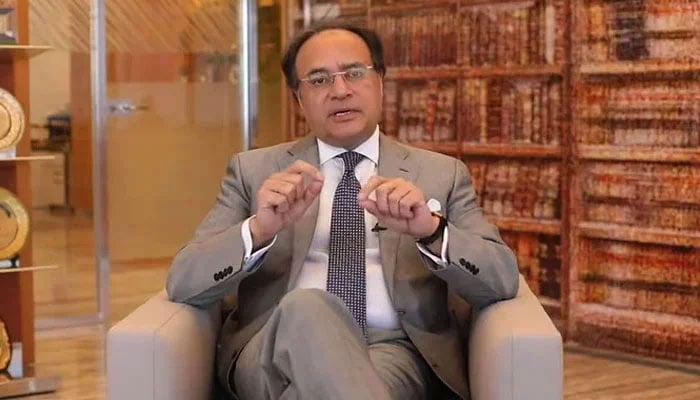Pakistan gearing up for structural reforms: Aurangzeb
The finance minister proposed a stronger public-private sector partnership for the economy’s improvement
WASHINGTON: Finance Minister Muhammad Aurangzeb on Tuesday maintained that Pakistan was gearing up for structural reforms in key areas and emphasized the need for a stronger public-private partnership.
On the second day of his trip, the finance minister attended the G-24 Finance Ministers and Central Bank Governors Meeting where he appreciated the support of the IMF and World Bank extended to Pakistan. “He talked about reforms in the areas of taxation, energy, privatization and digitalization, and underlined the need to bring in more private sector investment and leverage the Adaptation Fund to help the country deal with adverse impacts of the climate change,” said a statement issued by the finance ministry.
It was highly expected that the Finance Minister Muhammad Aurangzeb, would argue for a new multi-billion-dollar loan programme stretched over a couple of years and compensation out of the climate resilience fund during the IMF-WB Spring meetings.
Speaking at a local think tank, Atlantic Council on Monday, he also suggested that the proposed reforms in the international financial system that could reflect the modern economy would align with Pakistan’s interests. “Their focus on climate resilience funding, countries like Pakistan, we are not major emitters. We are dealing with adaptation financing and to the extent that these institutions come in to help countries like Pakistan both from an inclusive growth perspective and the climate change perspective, I think to that extent our interests are going to be very, very well aligned,” the finance minister has said.
Pakistan has kicked off discussions with the IMF for a larger and extended loan programme during which the country will focus on the growth and structural reform agenda, Aurangzeb said asserting that timely decisions and timely execution were key for it.
Talking about tax reforms, the minister maintained that the government needs to bring the undertaxed and untaxed sectors into the net. “We know what we need to do on the FBR’s side,” the finance minister said. “In the short term we intend to cut down on the leakages. We want decisions in the tax tribunals, which have been languishing, these lawsuits, for the longest time.” “When it comes to revenue and the tax authority, I think from our perspective, whenever you go through a transformation program -- its people, its process, its technology. But from our perspective, what we need to do, we have already embarked on that, which is we want to go an end-to-end digitisation of the tax authority so that we minimize the human intervention,” he explained. “It’s not only about revenues, it is about transparency,” he said adding that it would bring trust and confidence back into the tax authority.
The finance minister proposed a stronger public-private sector partnership for the economy’s improvement. “Only then we can create the fiscal space to figure out human capital development.” He also laid out areas of investment, particularly the IT and agriculture sectors as huge opportunities. “I do think these two sectors in particular represent jobs in the short term, in the medium term I think the metals -- in mining. I do think that’s going to go beyond Reko Diq, there are going to be other projects like that, which are going to become real game changer for Pakistan,” he said.
-
 Royal Family's Approach To Deal With Andrew Finally Revealed
Royal Family's Approach To Deal With Andrew Finally Revealed -
 Super Bowl Weekend Deals Blow To 'Melania' Documentary's Box Office
Super Bowl Weekend Deals Blow To 'Melania' Documentary's Box Office -
 Meghan Markle Shares Glitzy Clips From Fifteen Percent Pledge Gala
Meghan Markle Shares Glitzy Clips From Fifteen Percent Pledge Gala -
 Melissa Jon Hart Explains Rare Reason Behind Not Revisting Old Roles
Melissa Jon Hart Explains Rare Reason Behind Not Revisting Old Roles -
 Meghan Markle Eyeing On ‘Queen’ As Ultimate Goal
Meghan Markle Eyeing On ‘Queen’ As Ultimate Goal -
 Japan Elects Takaichi As First Woman Prime Minister After Sweeping Vote
Japan Elects Takaichi As First Woman Prime Minister After Sweeping Vote -
 Kate Middleton Insists She Would Never Undermine Queen Camilla
Kate Middleton Insists She Would Never Undermine Queen Camilla -
 King Charles 'terrified' Andrew's Scandal Will End His Reign
King Charles 'terrified' Andrew's Scandal Will End His Reign -
 Winter Olympics 2026: Lindsey Vonn’s Olympic Comeback Ends In Devastating Downhill Crash
Winter Olympics 2026: Lindsey Vonn’s Olympic Comeback Ends In Devastating Downhill Crash -
 Adrien Brody Opens Up About His Football Fandom Amid '2026 Super Bowl'
Adrien Brody Opens Up About His Football Fandom Amid '2026 Super Bowl' -
 Barbra Streisand's Obsession With Cloning Revealed
Barbra Streisand's Obsession With Cloning Revealed -
 What Did Olivia Colman Tell Her Husband About Her Gender?
What Did Olivia Colman Tell Her Husband About Her Gender? -
 'We Were Deceived': Noam Chomsky's Wife Regrets Epstein Association
'We Were Deceived': Noam Chomsky's Wife Regrets Epstein Association -
 Patriots' WAGs Slam Cardi B Amid Plans For Super Bowl Party: She Is 'attention-seeker'
Patriots' WAGs Slam Cardi B Amid Plans For Super Bowl Party: She Is 'attention-seeker' -
 Martha Stewart On Surviving Rigorous Times Amid Upcoming Memoir Release
Martha Stewart On Surviving Rigorous Times Amid Upcoming Memoir Release -
 Prince Harry Seen As Crucial To Monarchy’s Future Amid Andrew, Fergie Scandal
Prince Harry Seen As Crucial To Monarchy’s Future Amid Andrew, Fergie Scandal




